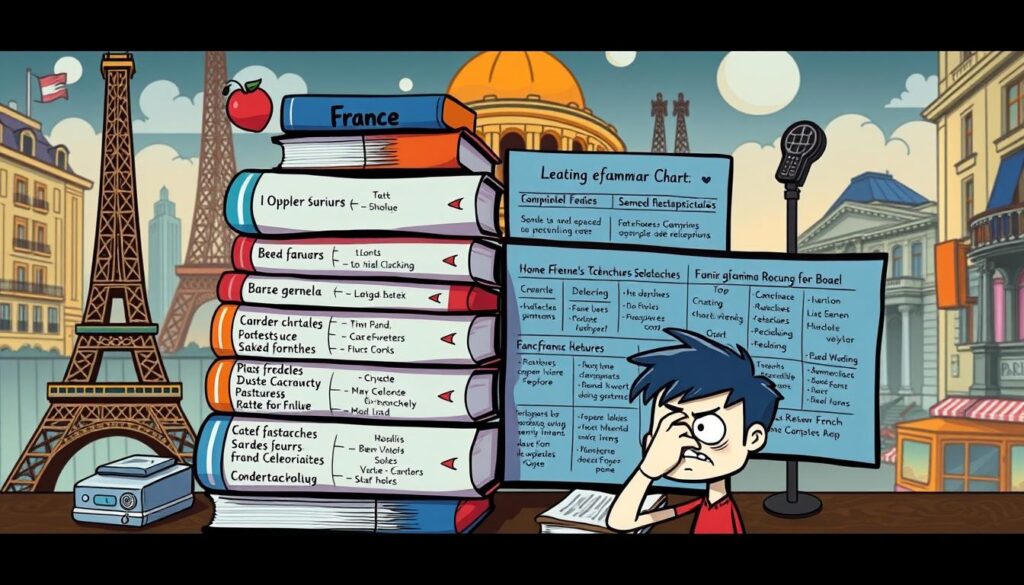Starting to learn a new language is exciting, but finding the right program can be hard. Rosetta Stone often comes up as a top choice for learning French online. Many say it’s the best language learning software. Is it really the best for French, though?
Rosetta Stone French offers a smooth way to learn through its 20-unit course, filled with realistic pictures and engaging activities. But is it truly the best? Each unit dives deep into lessons, making you ready to chat in French after some hard work.
Rosetta Stone’s plans, including lifetime access under $200, make it a tempting choice. It’s not just about the cost. This software aims to make you speak French fluently using advanced speech technology.
Rosetta Stone gives more than just language basics. It includes videos, cultural insights, and practice books. Live classes add a real French touch. This helps you to not just read and write, but also to speak French well.
Still, Rosetta Stone has its downsides, like being a bit repetitive and not clear on grammar. Without fun games like other apps, learning French might feel more like work. Yet, for those who like a visual and hands-on way to learn, Rosetta Stone could be incredibly useful.
Understanding the Rosetta Stone Approach to Learning French
The Rosetta Stone French course uses an innovative immersion learning method. It helps you learn French as naturally as children learn their first language. Instead of memorizing or translating, it uses visuals and sounds to link French phrases to real-life situations.
TruAccent technology is at the center of this method. It’s a smart speech recognition system. It compares your pronunciation to that of native speakers and offers feedback. This improves your accent and fluency.
Each of the 20 units ends with a speaking practice. It’s like having a real conversation with a native speaker. This builds your confidence and speaking skills step by step.
Lessons include matching images to spoken words. This method supports both listening and seeing. You start with basic vocabulary, advancing to complex sentences and dialogues. This way, you also get better at reading and writing.
Rosetta Stone also offers extra materials. You can explore short stories, video content, and live lessons through different plans. This variety enriches your learning and gives you a broad view of French culture.
In the world of language learning strategies, Rosetta Stone is unique. It strengthens your French skills without using your first language. This method pushes you to think in French, boosting your understanding and speaking faster. Users including business people and teachers have praised this approach. They say it helps open new ways to communicate and understand different cultures.
If you’re beginning or improving your French, the Rosetta Stone course is a guiding light. It offers not just lessons but a deep, natural connection with the language.
Is Rosetta Stone Good to Learn French: An In-Depth Look
If you’re thinking about learning French with Rosetta Stone, you’re probably wondering if it’s effective. Rosetta Stone is known for its unique way of teaching. It uses no translations, focusing instead on visual learning and building understanding of the language naturally.
The Visual Learning Advantage in Rosetta Stone’s Lessons
Visual learning is a big deal in Rosetta Stone’s French course. Every lesson uses pictures along with French words and phrases. This helps with remembering and using new vocabulary.
It’s easier to recall difficult phrases when they are linked to images. Many who have tried it say this method works well in reviews.
The Rosetta Stone program is designed around this visual learning idea. Each level is divided into units that use pictures to aid learning. This approach helps improve language skills without just memorizing.
Immersive Learning: How Rosetta Stone Removes English as a Crutch
Rosetta Stone uses immersion to teach French, meaning no English translations. This way, your brain learns French like it’s your first language. It helps you understand and use the language naturally. You have to think and respond in French, a method proven to build language skills.
The program includes many sessions where only French is used. This helps learners feel more immersed in the language. Learning French well often involves stepping away from using English all the time, and Rosetta Stone does this very deliberately.
Rosetta Stone’s courses are carefully made to support learning French deeply through speaking, listening, and pronunciation activities. While individual results may vary, many find Rosetta Stone’s method helpful for a genuine understanding of French.
This approach is great whether you want to improve your business French or enjoy French culture more fully. Both the visual and immersive learning parts are key to mastering the language.
Rosetta Stone’s Language Learning Programs: Pros and Cons
Rosetta Stone language courses give learners a strong base, especially for learning the French language. These courses use pictures and immersion to teach. This means you learn French by being surrounded by it, without translating from English.
The Rosetta Stone pros and cons are clear. On the plus side, it includes extra tools. Things like audio files, live lessons, and videos make learning better. Also, it uses spaced repetition, going over words again to help you remember.
- Immersive modules with constant reinforcement
- Supplementary materials like stories and phrasebooks
- Offline capabilities for on-the-go learning
But Rosetta Stone’s French courses can get boring because of repetition. The focus on grammar and writing is weak. Voice recognition, which should help with speaking, doesn’t always work well. Plus, it’s missing fun, real conversations for practice.
- Limited focus on grammar and writing
- Possible technical issues with speech recognition
- Lacks engaging conversational practice
Is Rosetta Stone right for you? It depends on how you like to learn. If you’re new, it’s good for basic vocabulary and listening. But if you want deep grammar study or interactive fun, it might not be enough. It all comes down to what you prefer for learning French.
Comparing Rosetta Stone French Course to Other Language Learning Software
Choosing how to learn French is important. You should compare French courses on different platforms. Rosetta Stone and Duolingo are two big names, but how do they compare to others like Babbel?
Rosetta Stone is famous for its immersive method. It uses visual scenarios and TruAccent™ speech recognition. This helps you learn without direct translation. On the other hand, Duolingo has a more game-like approach. This can sometimes make users skip over deep understanding to move ahead. To find what fits your learning style best, see this detailed comparison on how to effectively learn.
| Feature | Rosetta Stone | Duolingo | Babbel |
|---|---|---|---|
| Tech Used | TruAccent™ Speech Recognition | User-Sourced Translation | Variety of Exercise Types |
| Type of Instruction | Visual and Intuition-Based | Gamified Learning | Explicit Grammar Explained |
| Pricing | $189 Lifetime Access | Free, Plus Version Available | $299 Lifetime Subscription |
| Language Offerings | 23 Languages Excluding English | 37 Languages Excluding English | 14 Languages Including French |
| Criticisms | Lacks Explicit Grammar Instruction | Infantilized Learning Interface | Limited Engagement Features |
Each platform has its own upside and downside. Rosetta Stone aims for natural language learning through immersion. Duolingo is for those who like a fun, game-like feel. Babbel provides clear lessons that focus on grammar, unlike Rosetta Stone.
Choosing the best software depends on your learning style and what you want from a course. Maybe you like Babbel’s grammar focus, Rosetta Stone’s intuitive lessons, or Duolingo’s fun projects. Picking the right one is key to learning a new language well.
Remember, no one tool can make you fully fluent. A mix of different tools, extra materials, and practicing in the real world works best.
Assessing Rosetta Stone French Reviews and User Feedback
Looking into Rosetta Stone French reviews, we find a mix of opinions and stories. Users share their journeys of learning French. Some praise how the program boosted their speaking skills. Others point out where it could get better. This gives us a full picture of what to expect from the program.
Success Stories from Rosetta Stone French Users
Many users have shared their success with Rosetta Stone French. They talk about big improvements in their French. The program’s method makes learning feel natural, just like how we learn our first language. This helps users remember the language better, making their learning experience positive.
Some praise the TruAccent technology for making their pronunciation better. It gives fast and exact feedback. This boosts their confidence in talking with others in French. It also keeps their motivation up for learning.
Channels for User Engagement and Progress Tracking
Using Rosetta Stone’s tracking to monitor progress is very helpful for learners. The platform breaks lessons into easy parts. This way, learners can see how far they’ve come and set goals. Some wish for more fun elements in the lessons, similar to what Duolingo offers. They think this could make learning even more engaging and fun.
| Feature | User Feedback | Comparative Insight |
|---|---|---|
| Pricing | Varies from $200 for unlimited access to all languages to $500 for specific comprehensive sets. | More cost-effective than some competitors, but higher than free alternatives like library resources. |
| Technology | High praise for TruAccent speech recognition; mixed reviews for language matching functionality. | Superior pronunciation tools compared to some competitors, but lacks behind in innovative language practice methods. |
| Learning Method | Immersive without direct translations; highly immersive with visuals linked to audio. | Fosters quicker adaptation and context comprehension compared to traditional translation-based methods. |
| Customer Support | Feedback ranges from satisfied to users feeling neglected post-purchase. | Customer service experience is less consistent compared to leading language learning platforms. |
In conclusion, Rosetta Stone offers great tools for learning French, focusing on pronunciation and structured lessons. Adding more interactive features could make it even better. Reviewing these user experiences helps new learners choose the right language program.
Examining Rosetta Stone Effectiveness Through Learning French Online
Rosetta Stone stands out when you start learning French online. It’s known for easy-to-use lessons and has helped language learners for over 30 years. The technology is great for busy people because lessons are only 30 minutes. It also offers real-time pronunciation help and coaching from native speakers.
The unique method of Rosetta Stone avoids direct translations. It teaches you like you’re learning your first language. You can study through CDs, downloads, or online, giving you lots of choices. However, experts note it might lack in teaching enough vocabulary and grammar.
Rosetta Stone works better for languages close to English. For vastly different languages, it might be tough. It’s great for beginners to learn basic words and grammar. But to truly master the language, adding more learning tools is a good idea. People say it’s rewarding for new learners and helpful in educational environments. To excel, mix committed study, practice, and extra resources for better French skills.


